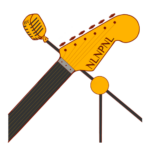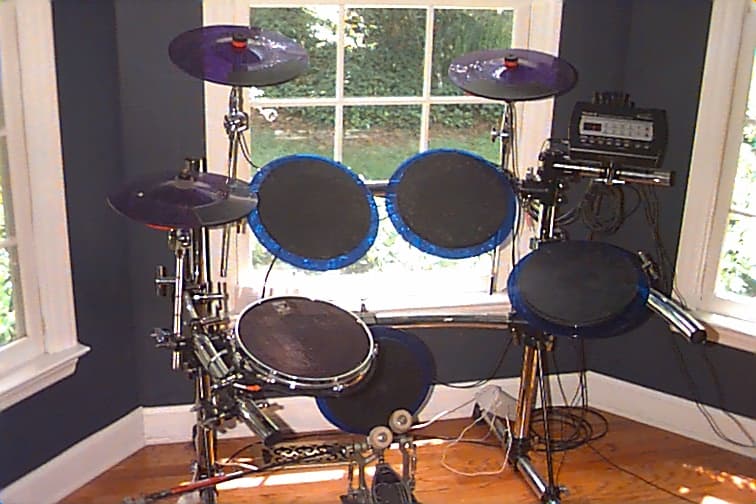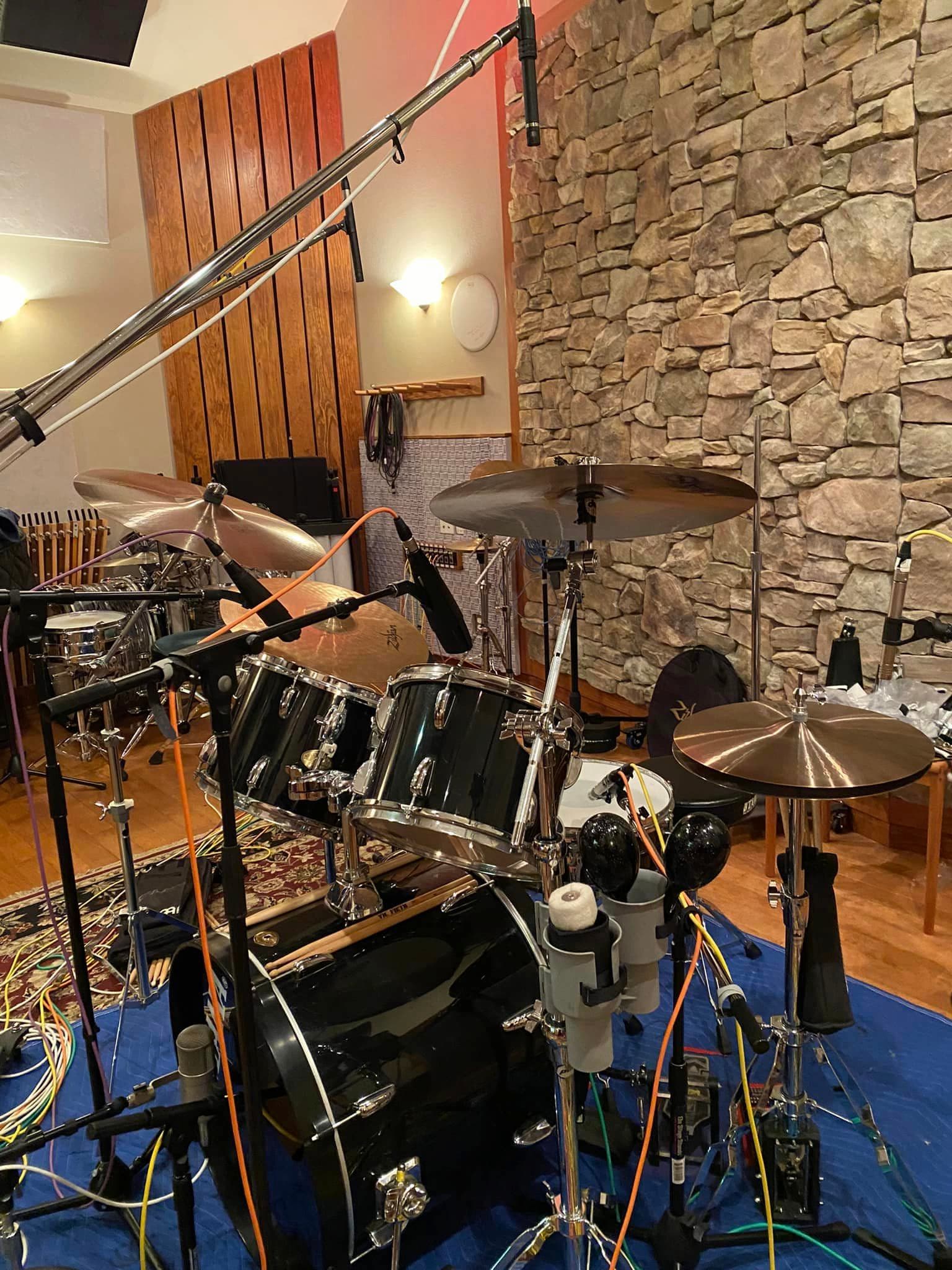You record songs at home, or you want to. But you don't have a drummer. What are your options? Here, we'll explore some ways to get high-quality drum tracks, and one option is free!
From A Live Drummer In A Recording Studio To Programming Drums
Let me make something clear. I love drummers. They can add so much to a song. But maybe you record your own songs and don't have a band. What can you do for drum tracks?
You can do anything from hiring a local drummer and taking them into a recording studio, to programming your own drums with a virtual drum kit. There are ways to accomplish all of these things, even if you're on a budget.
Here are some options . . .
But before we get into these options in detail, let's talk about what not to do.
Don't Try To Record Drums Yourself, Unless . . .
Unless you have mad skills, a bunch of gear, and a good sounding acoustic space, it's difficult to get good drum sounds. Even if home recording is your thing, consider going into the studio if you're set on a live drummer and acoustic drums.
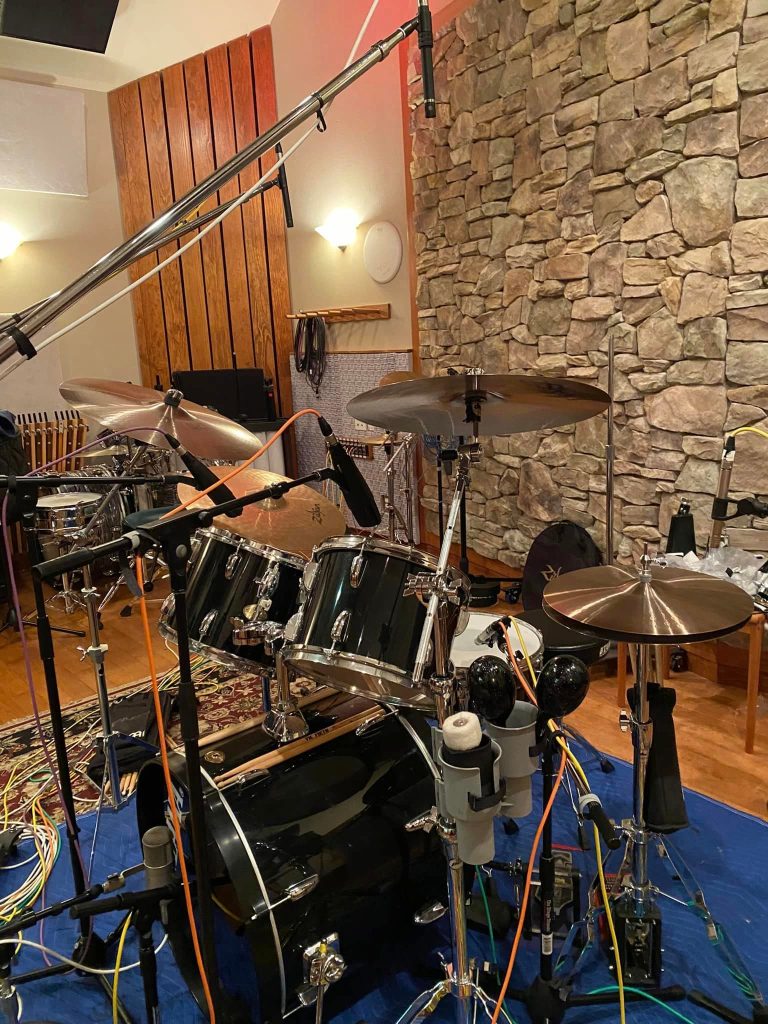
A full drum set, in the studio
However, there are ways to record live drums that make it easier and more affordable.
Audio Drum Loops
Also, grabbing an audio drum loop (a pre-recorded section of mixed drums that you can copy and paste) works for some genres. But it doesn't work for what I do. And frankly, I don't know much about it. So I'm going to skip that option.
But basically, audio drum loops are a lot less flexible than MIDI drum loops, as editing audio is more challenging than moving around a MIDI note.
Sometimes, people refer to MIDI drum patterns as MIDI drum loops, so make sure you know which you're getting -- audio or MIDI.
How To Hire A Drummer And A Studio On A Budget
There are lots of studios with unsold time. And some of them are owned by drummers or have deals with drummers. In many cases, the drums are already sitting in a studio room, with microphones set, and the console dialed in, ready to 'roll tape'.
All that has to happen is for the drummer to learn your song and play.
Quite a few drummers are already set up to record, and offer their services on Fivver or SoundBetter.
- You send them a recording of your song, perhaps to a click track.
- They send you back what's called 'stems', which are the individually recorded drum tracks.
- You slap the stems into your DAW and overdub.
MIDI Drum Tracks
Some of these drummers can also send MIDI drum tracks of what they played. You can use a virtual drum set (a kind of sample playback software oriented toward drums) to play back the MIDI track.
MIDI sensors placed on a drum, or MIDI drum pads send information about which drum was hit, and how hard. That information is recorded to a MIDI file on your DAW. When you play back the file, the same information is sent to a virtual drum set, which plays back drum samples.
MIDI tracks avoid the expense of microphones, stands and multi-channel consoles needed to record live drums. Plus, the drum samples you can use for playback are often recorded in top-level studios, with quality equipment.
MIDI Drum Packs
MIDI drum packs are collections of beats, fills, and full songs, recorded in MIDI format. If you have a virtual drum set, you can use patterns from the MIDI drum pack to 'play' the virtual drums.
MIDI is easy to modify and adapt, compared to recorded audio, so if a beat or a fill is not quite right, it's easy to change.
Virtual Drum Sets
Virtual drum sets are pieces of software that are oriented toward creating drum tracks.
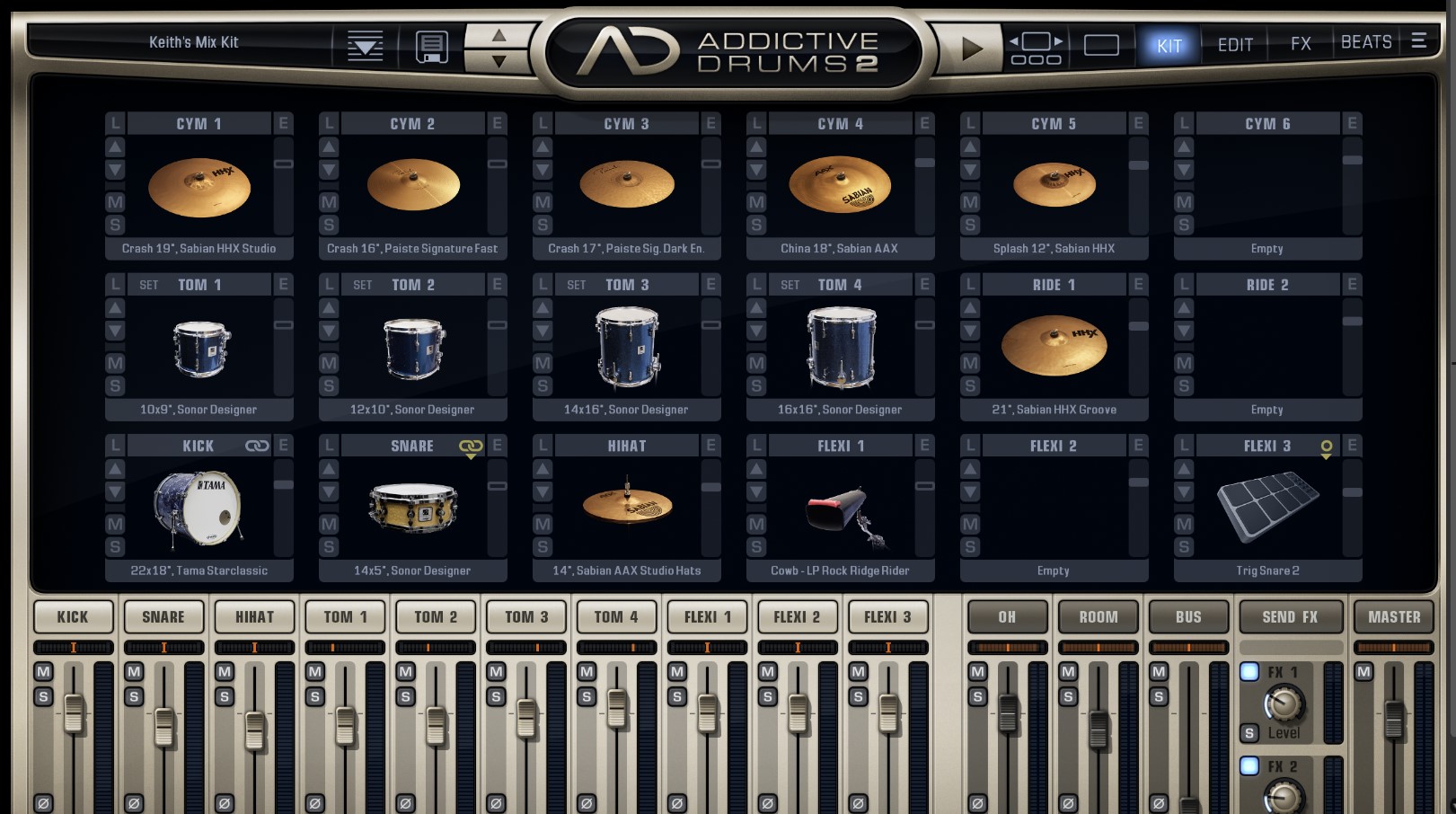
Addictive Drums 2, virtual drum kit -- by XLN Audio
Virtual drums consist of a variety of sampled drums, which can by played from a keyboard (computer or musical instrument), by controller pad, by clicking on the drum, or by MIDI file playback.
Drums For Your Home Recordings -- A Zero Budget Option
If you have zero budget, I have the answer for you. Steven Slate has SSD (Steven Slate Drums). It's virtual drum software which you can load up in your DAW. SSD has 3 free drum kits, and more available for purchase.
SSD also has some drum patterns built in. You can drag them into your song productions as MIDI files and alter them as you wish, for a complete drum track, for free. Or you can program your own drum patterns. If you don't have a DAW, head over to Reaper.fm and grab a 60-day trial of Reaper.
Personally, I use Addictive Drums 2. It's a paid plugin. I think the kit sounds very natural.
MIDI Drum Kits
Drummers can also play a MIDI drum kit, or a regular drum kit with sensors installed.
With a MIDI drum set, you don't record audio. You record the MIDI output of the kit, into your DAW. The MIDI notes trigger a virtual drum set's sounds.
A MIDI drum kit eliminates the need for a pro studio for recording drums and big rooms.
Drums For Home Recordings -- Pluses & Minuses Of Different Approaches
Recording drums yourself
A typical drum recording setup has 8-10 microphones. And each mic has a stand and cable, and needs a channel on your audio interface. All the gear is expensive. Plus, you've got mic choice and placement. Recording drums is one of the more technically challenging jobs for an audio engineer.
Even if you have the gear and the chops, you might not have the room. Studios cost money to build for a reason. It's expensive to make a room sound acoustically pleasing. But if you have a cathedral lying around, or a big living room with high ceilings -- go for it.
I'm not trying to scare you off. But if there was one thing to offload, this would be it.
The advantage of recording drums yourself is that you may not feel as worried as you are in the studio, when the clock is ticking and time is expensive. That means you can take time to get everything right. Plus, you'll have a real drummer, and benefit from your drummer's ideas.
Local drummer in the studio
It's a lot less to deal with than recording drums yourself. You're likely to have good quality microphones and a good console, as well as outboard compressors. But it can cost a fair mount of money.
Local drummer with a MIDI drum kit
You can record in your bedroom or basement, no problem with a MIDI drum kit. You need an interface that will record MIDI, but they're inexpensive. You can use Steven Slate Drums for the sounds, if you're looking for free.
Not a lot of drummers have MIDI kits, but if you find one, it can be an economical way to record.
Drummer from the internet
If they're already set up to record, it can be quicker than going into the studio. You can listen to their work in advance. They may be able to send audio and/or MIDI tracks of their performance.
This might be cheaper than going into the studio with a local drummer.
Try Fivver and SoundBetter.
The price on this kind of thing can vary greatly. And you know how the internet is, right? It's not your first day. You're unlikely to get as much control over the drum tracks as with a local drummer. You're not going to be able to rehearse. Some of these drummers will do a re-take with your feedback, though.
MIDI drum packs
You can buy MIDI drum packs in your genre for what an hour of studio time costs. Drum packs can have dozens or hundreds of beats, fills, and even a few complete songs in them. And they were often created by great drummers, playing live. And if you have good virtual drum software, they'll sound great.
The disadvantage is that these patterns are not made specifically for your song. You might need to modify the drum patterns, search for appropriate fills, etc.
Programming drums yourself
Maximum control with this method. And it can have low cost. But it takes time. Hours and hours of time. The main disadvantage is that you're probably not a drummer. Writing drum fills and little variations of the hi-hat beat (for instance) can be baffling when you haven't held a pair of sticks in your hands before.
Good drummers have great ideas for this kind of thing.
Resources
Fivver is a site where you can hire all kinds of services, including drummers who will send you drum tracks!
SoundBetter has "The world’s best mixing & mastering engineers, singers, songwriters, producers and studio musicians for hire", according to them. Those musicians include drummers!
Get the fully-functioning, never-expiring SSD 5.5 demo with one incredible Deluxe 2 Kit, as well as a Classic “mix-ready” processed Slate snare, and three unique kit presets including “Deluxe 2 Free”, “Hugo”, & “Dry n’ Tight” for FREE.
XLN Audio Addictive Drums 2 "Addictive Drums 2 is a software drum production studio featuring professionally recorded acoustic drums, live rhythm performances and high quality built in effects."
MIDI Drum Packs can be found at Yurt Rock, Groove Monkey (including some free MIDI drum loops), and Ugritone. I just went over to the Ugritone web site in preparation for this article, and now I'm getting discount offers in my Facebook freed. You might find the same. Many of the virtual drum kits also have some MIDI patterns, fills, and songs included.
Enjoy
Keith
